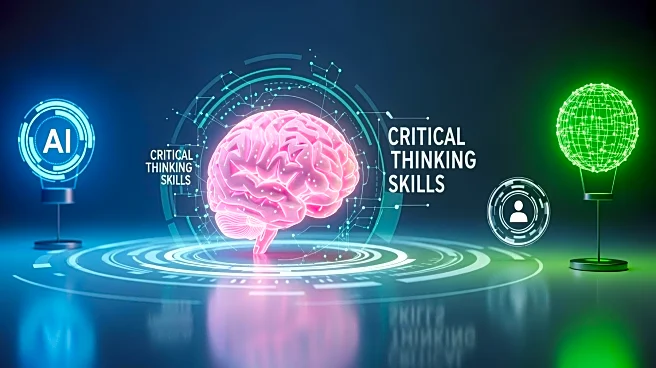What's Happening?
A growing body of research suggests that reliance on generative AI tools, such as ChatGPT, may be diminishing our ability to think critically and recall information. Studies have shown that even trained professionals tend to disengage their critical thinking
skills when using AI, leading to reduced brain connectivity and less memorable information. Experiments conducted by Nataliya Kos’myna at the Massachusetts Institute of Technology revealed that participants using ChatGPT exhibited lower brain connectivity compared to those relying on their own knowledge or traditional web searches. This has raised concerns about the cognitive costs associated with the widespread use of AI tools.
Why It's Important?
The implications of these findings are significant for education, professional development, and cognitive health. As generative AI becomes more integrated into daily life, there is a risk that individuals may become overly reliant on these tools, leading to a decline in critical thinking and problem-solving abilities. This could affect various sectors, including academia, business, and technology, where innovation and analytical skills are crucial. Understanding the impact of AI on cognitive processes is essential for developing strategies to mitigate potential negative effects and enhance the positive aspects of AI use.
What's Next?
Researchers are exploring ways to use AI tools to enhance rather than undermine cognitive engagement. Strategies include encouraging users to think independently before consulting AI and using AI to challenge existing knowledge rather than replace it. Future studies may focus on identifying best practices for AI use that promote cognitive development and prevent cognitive laziness. Additionally, there may be efforts to educate users on the potential cognitive biases associated with AI reliance and how to counteract them.
Beyond the Headlines
The ethical implications of AI's impact on cognition are profound, as they touch on issues of autonomy, privacy, and the nature of human intelligence. There is a need for ongoing dialogue about the role of AI in society and how it can be harnessed responsibly. Furthermore, the potential for AI tools to influence behavior and decision-making raises questions about the integrity of human interactions and the authenticity of communication.















